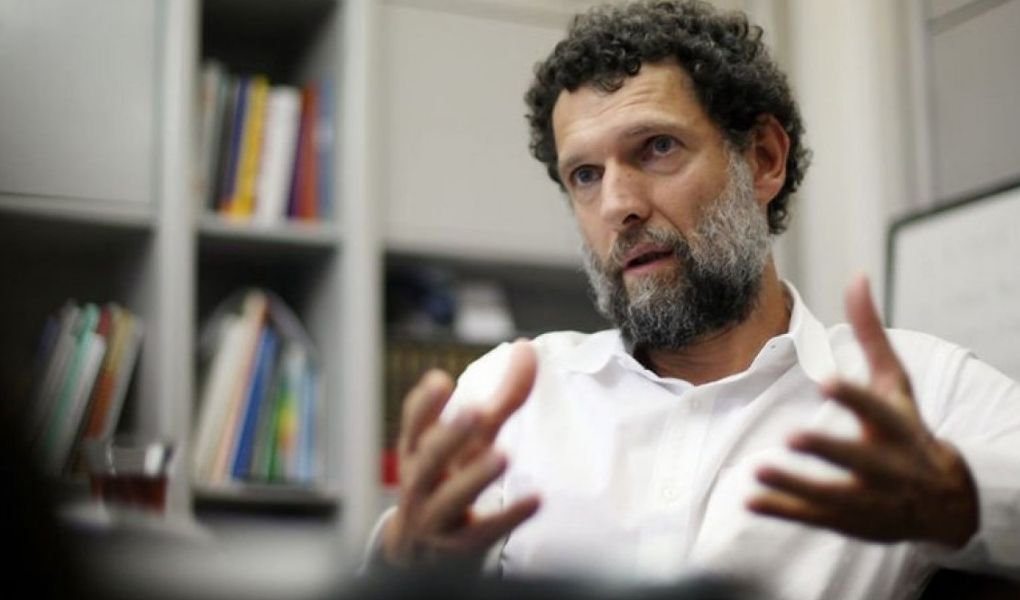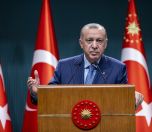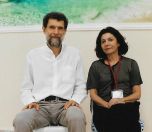Click to read the article in Turkish
"It would have been rational for the statement to be also taken as a warning that it may initiate infringement procedures against Turkey. But it unfortunately did not create such a reaction in public opinion. Despite it all, I believe that a common initiative by the representatives of European countries, together with the U.S., New Zealand and representatives of Canada, was beneficial in terms of creating a foreign relations atmosphere sensitive to human rights. This is not solely about Turkey."
This is how jailed businessperson Osman Kavala has evaluated the joint statement of 10 ambassadors (of Germany, United States, Denmark, Finland, France, Netherlands, Sweden, Canada, Norway and New Zealand) calling for his release, which caused a diplomatic crisis.
Behind bars for 1,464 days in Turkey, Osman Kavala has answered the questions of Germany's Der Spiegel magazine.
CLICK - Osman Kavala's fourth year in prison
CLICK - Osman Kavala: My participation in hearings, presenting a defense would be meaningless
'Not complying with ECtHR rulings is interference'
In his interview to Der Spiegel, Kavala has expressed his disagreement with the view that the ambassadors' statement meant an interference with the internal affairs, especially with the judiciary:
"If interference in the judiciary is the issue, it happened two years ago with the European Court of Human Rights (ECtHR) rulings that complied with the European Human Rights Convention and our Constitution.
"The ECtHR's ruling does not only concern the judiciary, it also serves as a warning to the government not to interfere in the judiciary. Unfortunately, requirements of this ruling were not fulfilled."
Kavala has also recalled that "previously, the European Council Committee of Ministers made a series of decisions for the implementation of the ECtHR rulings, inviting Turkish officials to take steps."
"There were similar statements made by European capitals and the European Parliament," he has added further.
Referring to the plans to declare the 10 ambassadors as "personae non gratae", Osman Kavala has said:
"It looks like a highly emotional reaction or a gesture intended for domestic politics. Fortunately, it was not put into action."
CLICK - Erdoğan backs down: Our intention is never to cause a crisis
Dialogue instead of EU sanctions
Kavala has reiterated that "the ECtHR determined that the European Human Rights Convention's Article 18 was violated," which means, "it was determined that his arrest was politically motivated."
In response to a question whether the European Union (EU) should impose sanctions on Erdoğan government, Osman Kavala has said, "I can say that the continuation of dialogue and cooperation in a way that will consistently address issues of human rights and the rule of law will be the appropriate approach before resorting to sanctions."
'It may be just a wish'
When asked, "Do you think you will ever be released from prison while Erdoğan is in power," Kavala has answered:
"I guess that there will be a tense political environment until the next elections. It seems that rhetoric, echoing conspiracy theories about foreign powers actively (seeking) to topple the government, will be used during this period. That's why, my imprisonment until elections may be just a wish.
On the other hand, the European Council Committee of Ministers, which oversees the implementation of ECtHR decisions, declared that it will decide to start infringement procedures unless I am released by the end of November. If this procedure begins and the cost of not complying with the ECtHR decision weighs heavier than the benefits of keeping me in prison, I could be released before the elections.
A brief summary of Osman Kavala's arrest17 October 2017: Osman Kavala was detained. 1 November 2017: Kavala was ordered arrest on the charges of 'attempting to overthrow the government or to prevent it from exercising its functions' (Article 312 of the TCC) and 'attempting to overthrow the constitutional order through force and violence' (Article 309 of the TCC). 24 December 2018: The investigation files under Article 309 and 312 of the TCC were separated. 19 February 2019: The first indictment against Kavala was issued under Article 312 of the TCC 16 months after he was arrested. 11 October 2019: A release order was issued in favor of Kavala on the charge under Article 309 of the TCC. 10 December 2019: The ECtHR ruled that Kavala's detention constituted a violation of human rights and that he should be released immediately. 18 February 2020: A decision of acquittal was issued in the trial heard under Article 312 of the TCC. 19 February 2020: After the decision of acquittal, Kavala was not released but was arrested again on the charge under Article 309 of the TCC. 9 March 2020: Kavala was ordered arrest under Article 328 of the TCC. 20 March 2020: The second release order was issued in favor of Kavala under Article 309 of the TCC. However, his detention on the charge of espionage under Article 328 of the TCC continued. 3 September 2020: The Committee of Ministers of the Council of Europe, which oversees the execution of the judgments of the ECtHR, ruled that the judgment of the ECtHR should be executed and that Kavala should be released immediately. 29 September 2020: The Constitutional Court of the Republic of Turkey decided to examine the application of Kavala regarding his unlawful detention. However, it postponed the examination as the second indictment including the charges under Articles 309 and 328 (espionage) of the TCC was submitted to the court on the same day. 29 September 2020: In the second meeting in which this matter was discussed, the Committee of Ministers of the Council of Europe ruled that an interim decision should be drafted to be issued in the event that the judgment of the ECtHR is not executed. 3 December 2020: The Committee of Ministers of the Council of Europe issued an interim decision that Kavala should be released immediately and that the Constitutional Court should examine the file in accordance with the judgment of the ECtHR without further delay. 15 December 2020: The Constitutional Court decided to examine the application regarding the unlawful detention and ruled that the file should be referred to the General Assembly of the Constitutional Court. 18 December 2020: The 36th Assize Court ruled that the detention shall continue. The second hearing was scheduled on 5 February. 29 December 2020: The Constitutional Court ruled with 8 to 7 votes that the decision of Kavala did not constitute any violation of right. The reasoned judgment included the strongly dissenting opinions of the judges who voted that the detention constituted a violation of rights. 22 January 2021: The Appellate Court overturned the decision of acquittal in the Gezi trial. It ruled that the file concerning this trial shall be examined together with the files under Articles 309 and 328 of the TCC. 28 January 2021: After the decision of acquittal was overturned, the 30th Assize Court issued a preliminary proceedings report and scheduled the trial concerning the consolidated files on 21 May 2021. 5 February 2021: In the trial heard in the 36th Assize Court, the Court ruled that Kavala's trial shall be consolidated with the Gezi Trial, which will be heard again in the 30th Assize Court under Article 312 of the TCC, and that the detention of Kavala on the charges of espionage under Article 328 of the TCC shall continue. 30 April 2021: As a result of its examination of the detention, the 30th Assize Court ruled that the detention of Kavala shall continue. 12 May 2021: In its weekly meeting of 12 May 2021, the Committee of Ministers of the Council of Europe reviewed Kavala's file and expressed their great concern that Turkish authorities and courts did not take the necessary steps to end Kavala's the continued detention against the judgment of the ECtHR. The Committee urged the member states to bring up the continued detention and immediate release of Kavala during their meetings with Turkish authorities. It pointed out that the detention of Kavala would be reviewed again by the 30th Assize Court on 21 May 2021, and urged the authorities to take all the necessary steps to ensure the release of Kavala. 21 May 2021: At the hearing held by the İstanbul 30th High Criminal Court, the court board ruled that Osman Kavala's arrest on "espionage" charges should continue. The court board also demanded that the Gezi file about the çArşı group should be examined in consideration of a possible merging of the cases and be sent back to the court. 9 June 2021: The Committee of Ministers of the Council of Europe announced that it would bring infringement proceedings against Turkey in the event of Turkey's continued failure to implement the ECtHR ruling on Kavala. It noted that his imprisonment was against international law and Kavala should be released immediately. 28 July 2021: Temporarily appointed as the Presiding Judge of the 13th High Criminal Court during the judicial recess, the Presiding Judge of the İstanbul 30th High Criminal Court, as the Presiding Judge of the local court which had not given consent, gave consent to his own request for merging the cases. 2 August 2021: Even though the İstanbul 30th High Criminal Court was to hold a hearing on August 6, it held a hearing four days before, ruled by a majority of votes that the case should be merged with the ongoing case at the İstanbul 13th High Criminal Court and Osman Kavala's arrest should continue. 17 September 2021: The Committee of Ministers of the Council of Europe decided to wait before imposing sanctions on Turkey over its failure to implement the ECtHR rulings on Osman Kavala and Selahattin Demirtaş, the jailed former Co-Chair of the Peoples' Democratic Party (HDP). It reiterated its call for Kavala's release. CLICK - Committee of Ministers of Council of Europe: Release Demirtaş and Kavala |
(KÖ/SD)







-132.jpg)


-132.jpg)
